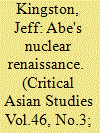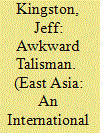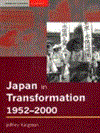|
|
|
Sort Order |
|
|
|
Items / Page
|
|
|
|
|
|
|
| Srl | Item |
| 1 |
ID:
147254


|
|
|
|
|
| Summary/Abstract |
One of the great conundrums of Abe’s second term is how he has managed to retain healthy levels of public support while polls consistently show a majority opposes every one of his signature policies
|
|
|
|
|
|
|
|
|
|
|
|
|
|
|
|
| 2 |
ID:
132902


|
|
|
|
|
| Publication |
2014.
|
| Summary/Abstract |
Prime Minister Abe Shinz()'s nuclear renaissance involves downplaying risks, restarting reactors, building new ones, and exporting reactor technology and equipment. Polls in japan indicate that the public remains overwhelmingly op- posed to Abe's nuclear agenda, but in various national and local elections since late 2012 antinuclear candidates have not fared well. This article examines the disjunc-ture between public preferences and electoral outcomes and why is it likely that Japan will restart reactors despite widespread concerns about safety, the high costs of nuclear energy, and the lack of a site for permanent disposal of nuclear waste. The safety myth is being reealibrated, but the author argues that it remains based on rosy assumptions in a nation especially prone to massive seismic disasters. The reinstatement of nuclear energy in the 2014 national energy policy marks a victory for the nuclear village, a remarkable example of institutional resilience in the face of extremely adverse developments since the massive earthquake and tsunami of 1 1 March 2011 that precipitated three reactor meltdowns in Fukushima. Despite extensive revelations about shoddy safety practices in the nuclear industry and collusive relations between regulators and those they regulate, Abe has successfully promoted a nuclear revival that few would have thought possible before his election in 2012. Reactor restarts face a number of hurdles, but the pronuclear lobby now finds it has a policy opening. The summer of 2014 has been a nuclear-free one, but in all likelihood it will be Japan's last for decades to come.
|
|
|
|
|
|
|
|
|
|
|
|
|
|
|
|
| 3 |
ID:
080459


|
|
|
|
|
| Publication |
2007.
|
| Summary/Abstract |
Yasukuni Shrine resonates with talismanic symbolism for both its critics and proponents and that is precisely why it is so controversial within Japan and between Japan and its neighbors. Controversy over Yasukuni is rooted in the broader historical debate about war memory, responsibility, and reconciliation. Competing narratives about this past send mixed signals to neighbors and prevent reconciliation. Despite Prime Minister Koizumi's six visits, Yasukuni is an awkward talisman and many Japanese, including conservatives, oppose these visits. The Shrine's image has been cast and no amount of artful repackaging will obscure its indelible links with Japan's discredited Imperial ideology and the costs it exacted. The Yasukuni dilemma involves shifting the focal point of official war remembrance away from the Shrine to a secular war memorial where people and officials can pay respect to the war dead free from political agendas and historical baggage
|
|
|
|
|
|
|
|
|
|
|
|
|
|
|
|
| 4 |
ID:
080732


|
|
|
|
|
| Publication |
2008.
|
| Summary/Abstract |
The Saffron Revolution is Burma's 9/11; much will never be the same. The regime's harsh crackdown and killing of monks in fall 2007 has aroused a new generation of dissidents. Economic grievances have morphed into antigovernment political protests, and the political situation has become even more polarized. Burma's 9/11 may also be sowing dissension within the military as ostracism from the sangha (Buddhist community) and popular revulsion affects institutional interests, ones that may no longer be identical to those of the ruling junta, the State Peace and Development Council (SPDC). The government's seven-step roadmap to democracy appears to have lost all credibility, and no one believes that the military or its proxies will implement the proposed Constitution in good faith. There is concern that the SPDC is only going through the motions of the UN-sponsored dialogue and still hopes to impose a democracy in shackles. Indonesia has provided inspiration for the SPDC, especially the paramount political power exercised by the Indonesian military during the New Order era (1967-98), but the junta fails to see that this model has already been overtaken by events and popular aspirations. Meanwhile, the international community debates how to break through the current impasse, given that economic sanctions and constructive engagement have not produced any progress. Transforming unprecedented international attention to Burma's plight into sustained support for alleviating severe humanitarian conditions, promoting nation building, and nurturing a time-bound dialogue for national reconciliation and democratization remains a key challenge
|
|
|
|
|
|
|
|
|
|
|
|
|
|
|
|
| 5 |
ID:
058172


|
|
|
|
|
| Publication |
London, Longman, 2001.
|
| Description |
xii, 230p.: mapspbk
|
| Series |
Seminar Studies in History
|
| Standard Number |
0582418755
|
|
|
|
|
|
|
|
|
|
|
|
Copies: C:1/I:0,R:0,Q:0
Circulation
| Accession# | Call# | Current Location | Status | Policy | Location |
| 044636 | 952.04/KIN 044636 | Main | On Shelf | General | |
|
|
|
|
| 6 |
ID:
167632


|
|
|
| 7 |
ID:
058088


|
|
|
|
|
| Publication |
London, routledgeCurzon, 2004.
|
| Description |
xvi, 358 p.
|
| Series |
Asia's transformations
|
| Standard Number |
0415274826
|
|
|
|
|
|
|
|
|
|
|
|
Copies: C:1/I:0,R:0,Q:0
Circulation
| Accession# | Call# | Current Location | Status | Policy | Location |
| 048975 | 303.40952/KIN 048975 | Main | On Shelf | General | |
|
|
|
|
| 8 |
ID:
160207


|
|
|
|
|
| Publication |
West Sussex, John Wiley and Sons Ltd, 2017.
|
| Description |
xxii, 314p.pbk
|
| Standard Number |
9780470673027
|
|
|
|
|
|
|
|
|
|
|
|
Copies: C:1/I:0,R:0,Q:0
Circulation
| Accession# | Call# | Current Location | Status | Policy | Location |
| 059466 | 320.5/KIN 059466 | Main | On Shelf | General | |
|
|
|
|
| 9 |
ID:
124592


|
|
|
|
|
| Publication |
2013.
|
| Summary/Abstract |
Large antinuclear demonstrations in 2012 and significant expansion of renewable energy have sparked a degree of euphoria about the prospects for phasing out nuclear energy in Japan. But Prime Minister Abe Shinzo is pronuclear and favors restarting Japan's idled reactors. His Liberal Democratic Party now controls both houses of the Diet and is a key pillar of Japan's nuclear village, comprising influential government, business, and political institutions that advocate nuclear energy. The nuclear village retains veto power over national energy policy, and citizens will not get to decide the outcome even if public opinion polls indicate that a vast majority favor phasing out nuclear energy. By ignoring many of the lessons of Fukushima and fast-tracking reactor restarts, the government and utilities continue to downplay risk, leaving Japan vulnerable to another nuclear accident.
|
|
|
|
|
|
|
|
|
|
|
|
|
|
|
|
|
|
|
|
|